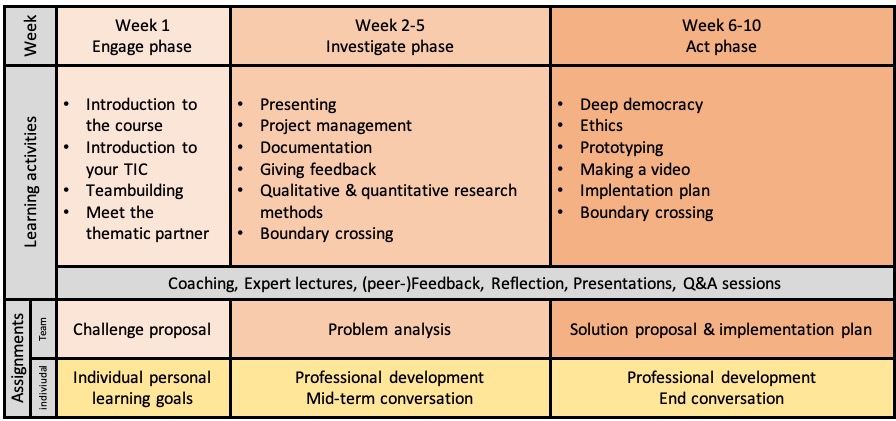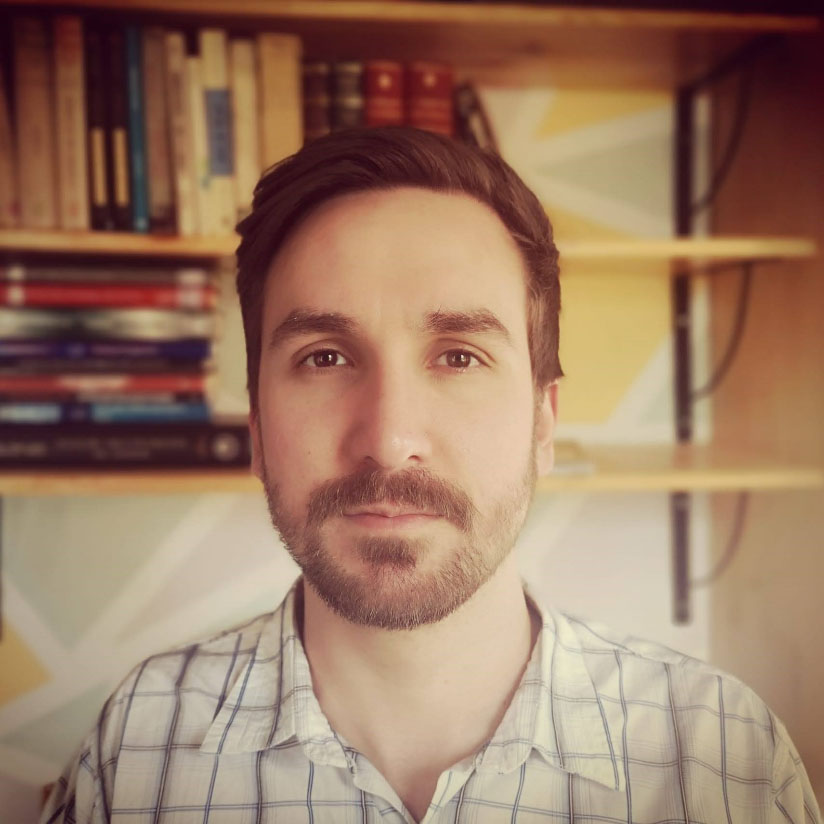
Tackling real-world problems through Interdisciplinary Collaboration (TIC)
Tackling Real-World Problems through Interdisciplinary Collaboration (TIC) is an elective course of 10-21 hours/week (depending on one’s availability) that brings together second- and third-year bachelor’s students, master’s students, and professionals to work in interdisciplinary teams on pressing societal challenges provided by partners outside the university. Through this hands-on, community-engaged learning (CEL) experience, participants deepen their interdisciplinary skills and learn how to make tangible societal impacts.
The course features a rich mix of workshops, guest lectures, teamwork and discussions. Working together in diverse groups, students and professionals apply their theoretical knowledge to craft practical, real-world solutions—such as prototypes, videos, policy proposals, school programs or symposia.
Each edition of TIC presents four thematic challenges closely aligned with Utrecht University’s strategic themes:
- Investing in the Future (Institutions for Open Societies)
- Youth on the Move (Dynamics of Youth)
- Nature Based Solution (Pathways to Sustainability)
- One Health (Life Sciences)
Participants can indicate their preference for two themes, and interdisciplinary teams are carefully assembled to ensure diversity and alignment with individual interests. Join TIC to gain valuable interdisciplinary and ‘community engaged’ skills and help shape original and impactful solutions to today’s most urgent societal challenges.
Check out the course website for more information.
Get to know TIC:
How professionals experienced this course and what they learned:
To navigate the TIC process, participants are placed within a team of 4-5 other students and professionals working together on a specific societal problem. The TIC course incorporates a variety of different learning components including workshops, expert lectures, scientific and societal research, group work as well as reflection and personal development opportunities, amongst others.
Three phases
The course consists of three phases to guide students and professionals to engage with the different challenges and develop their solutions.
ENGAGE: translating the societal partner’s broadly presented problem to a well-defined challenge. (week 1) We start with a broad concept that can be explored in multiple ways – the ‘big idea’. The aim is to narrow down and personalize the big idea, into a call for action, making it an immediate, actionable, and exciting challenge.
INVESTIGATE: look at the challenge from different perspectives (weeks 2-5). In this phase, you will conduct content- and concept-based research to create a foundation for actionable and sustainable solutions.
ACT: develop and test solutions (week 6-10) In this last phase, you will develop grounded solutions and implement them in authentic settings, receive and handle feedback, and learn from successes and failures.
Since personal development is an important component of the course, participants are guided through the process of personal and professional reflection throughout the course, alongside their group’s research into a solution to the societal problem. During the course, participants review their own strengths and weaknesses regarding interdisciplinary and cross-level collaboration and their ability to connect science and society. Additionally, participants are asked to review what they bring to the group in relation to others as well as evaluate their personal and professional growth.

The TIC course is a 10-week course. To navigate the TIC process, participants are assigned to a team of 4-5 other students and lifelong learners working together on a specific societal problem. The TIC course incorporates a variety of different learning components including workshops, expert lectures, scientific and societal research, group work as well as reflection and personal development opportunities, amongst others.
More information at course website
Course coordinator:
Matthijs Roobeek MSc

“Stepping outside of the classroom and your core discipline to address a societal problem is probably the best learning experience one can have at any University. In the TIC course you do so, while also interacting with students from different faculties, professionals, and civil organisations. A unique learning opportunity!”
Course coordinator:
Dr. Yolanda van Beek

“In the TIC course you not only learn by working together with students from other disciplines, but you also learn how to apply knowledge from your own discipline to current complex social issues. Together with societal partners outside the university we aim at achieving sustainable developmental goals that foster a healthy planet.”
Course coordinator:
Dr. Vinicius Coscioni

“Interdisciplinary work and community-engaged learning are vital for creating inclusive and sustainable solutions to global challenges.”
Entry requirements
In order to be eligible for this course, you need to:
- have completed a master’s degree (at HBO or WO level);
- be willing to spend at least 10 hours per week on this course. For questions about your eligibility, please contact tic@uu.nl.
Course information
- Registration is possible between September 15 and October 27, 2025
- This course runs in period 2 of academic year 2025-2026, starting in the week of 12 November
- A max. of 10 professionals can follow this course
- Fee: 2000 euros
- Payment methods: direct payment or invoice
- Cancellation policy: according to UU terms and conditions
- For administrative questions, please contact science.bio.ba@uu.nl.
Please contact us at tic@uu.nl if you have any questions.
